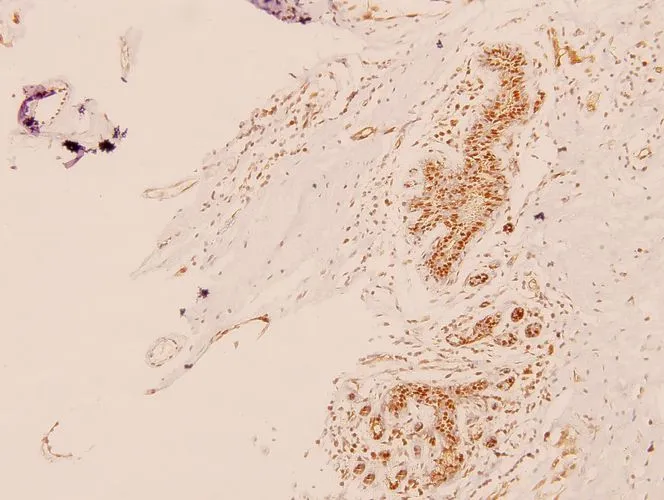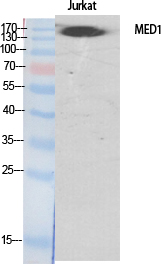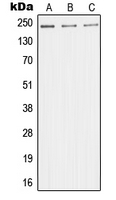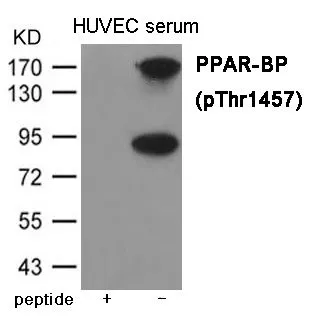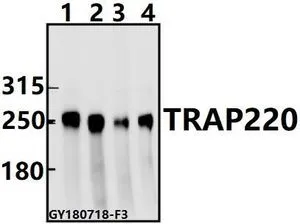
WB analysis of various samples using GTX66658 MED1 antibody. Lane1 : A549 whole cell lysate(40ug) Lane2 : HEK293T whole cell lysate(40ug) Lane3 : PC12 whole cell lysate(40ug) Lane4 : CT26 whole cell lysate(40ug) Dilution : 1:500
MED1 antibody
GTX66658
ApplicationsWestern Blot, ImmunoHistoChemistry, ImmunoHistoChemistry Paraffin
Product group Antibodies
ReactivityHuman, Mouse, Rat
TargetMED1
Overview
- SupplierGeneTex
- Product NameMED1 antibody
- Delivery Days Customer9
- Application Supplier NoteWB: 1:500-1:1000. IHC-P: 1:50-1:200. *Optimal dilutions/concentrations should be determined by the researcher.Not tested in other applications.
- ApplicationsWestern Blot, ImmunoHistoChemistry, ImmunoHistoChemistry Paraffin
- CertificationResearch Use Only
- ClonalityPolyclonal
- Concentration1 mg/ml
- ConjugateUnconjugated
- Gene ID5469
- Target nameMED1
- Target descriptionmediator complex subunit 1
- Target synonymsCRSP1, CRSP200, DRIP205, DRIP230, PBP, PPARBP, PPARGBP, RB18A, TRAP220, TRIP2, mediator of RNA polymerase II transcription subunit 1, ARC205, PPAR-binding protein, PPARG binding protein, TR-interacting protein 2, TRIP-2, activator-recruited cofactor 205 kDa component, p53 regulatory protein RB18A, peroxisome proliferator-activated receptor-binding protein, thyroid hormone receptor-associated protein complex 220 kDa component, thyroid hormone receptor-associated protein complex component TRAP220, thyroid receptor interacting protein 2, vitamin D receptor-interacting protein 230 kD, vitamin D receptor-interacting protein complex component DRIP205
- HostRabbit
- IsotypeIgG
- Protein IDQ15648
- Protein NameMediator of RNA polymerase II transcription subunit 1
- Scientific DescriptionThe activation of gene transcription is a multistep process that is triggered by factors that recognize transcriptional enhancer sites in DNA. These factors work with co-activators to direct transcriptional initiation by the RNA polymerase II apparatus. The protein encoded by this gene is a subunit of the CRSP (cofactor required for SP1 activation) complex, which, along with TFIID, is required for efficient activation by SP1. This protein is also a component of other multisubunit complexes e.g. thyroid hormone receptor-(TR-) associated proteins which interact with TR and facilitate TR function on DNA templates in conjunction with initiation factors and cofactors. It also regulates p53-dependent apoptosis and it is essential for adipogenesis. This protein is known to have the ability to self-oligomerize. [provided by RefSeq, Jul 2008]
- ReactivityHuman, Mouse, Rat
- Storage Instruction-20°C or -80°C,2°C to 8°C
- UNSPSC41116161

